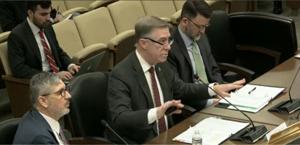(The Center Square) – Missouri Andrew Bailey joined 21 other Republican attorneys general in filing a legal brief urging the Colorado Supreme Court to hear an appeal by a Christian cake artist who lost a First Amendment case in a lower court.
Last month, Masterpiece Cakeshop owner Jack Phillips and the Alliance Defending Freedom filed a petition with Colorado’s highest court to overturn a state Court of Appeals decision. It found Phillips violated Colorado’s Anti-Discrimination Act when in 2012 he refused to make a blue and pink cake for attorney Autumn Scardina who stated in a phone conversation it was to celebrate transitioning from male to female.
The amicus brief filed by the attorneys general urges the Colorado Supreme Court to hear Phillips’ petition and rule he can’t be compelled to create a custom cake expressing a message contrary to his religious beliefs.
The conclusion of the 14-page document states Phillips engages in “expressive conduct protected by the First Amendment. The gender-transition cake Scardina requested was no exception; creating it would require Phillips to express a readily understood message about sex with which he disagrees. This Court should vindicate his right to not speak.”
The brief argues a gender-transition cake is symbolic speech and states the lower courts misapplied First Amendment doctrine. The brief concludes a ruling in favor of Phillips wouldn’t license discrimination.
“Scardina and the lower courts treat Phillips’ refusal to bake a gender-transition cake as a blow to LGBT equality,” the brief states. “But ruling for Phillips wouldn’t upend the long-settled rule that ‘business owners’ may not ‘deny protected persons equal access to goods and services.’ It would simply confirm that Colorado’s antidiscrimination law cannot be applied in the rare case where it would compel speech.”
The brief also states Phillips “happily serves LGBT customers: he’ll sell them premade cakes for any purpose and create custom cakes that do not express a message contrary to his religious beliefs. … Of course, for Scardina, that’s not good enough.”
Joining Bailey are attorneys general from Alabama, Alaska, Arkansas, Georgia, Idaho, Indiana, Iowa, Kentucky, Kansas, Louisiana, Mississippi, Montana, Nebraska, North Dakota, Ohio, South Carolina, South Dakota, Tennessee, Texas, Utah, and West Virginia.
“As Attorney General, I will always protect the Constitution, which includes the basic right to freedom of speech enshrined in the First Amendment,” Bailey said in a statement. “Americans enjoy the right not to speak as much as they enjoy the right to speak, and compelling a cake baker to speak in a way that violates his religious beliefs is a textbook violation of the First Amendment.”

















































